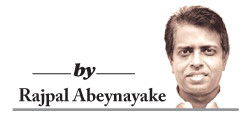 If there is an informal economy in this country, who runs it? Every country has an informal economy, and Sri Lanka’s is particularly large. Around 5.5 million of the 8.2 million employees in the country function in the informal economy. This statistic should boggle the mind.
If there is an informal economy in this country, who runs it? Every country has an informal economy, and Sri Lanka’s is particularly large. Around 5.5 million of the 8.2 million employees in the country function in the informal economy. This statistic should boggle the mind.
That’s a whopping 67 percent of the workforce, according to recent statistics. This is around two-thirds of all the people who work, who are not protected by labour laws, and do not function within the legal framework that safeguards employee rights.
Who employs all these people who constitute this so-called informal-workforce? Statistics indicate that a great many of them are employed in agriculture. Records also show that a certain proportion — albeit a minority — of the folk in the informal economy are employers and not employees.
Other areas of work in the informal economy are the garment industry where the work of sewing parts of finished garments is outsourced by employees to freelancers in the informal sector, while in the hotel sector, informal-sector employees undertake outsourced chores such as washing up dishes.
The foregoing description should offer some indication of what the massive informal-sector looks like. Workers may not have regular protections, but some in the informal-sectors — employees and employers — make good money despite everything.
FUNCTIONING
This article, however, does not intend to be a critique about the informal economy per se or about matters that are confined to this sector of our economy that obviously contributes enormously to our Gross Domestic Product (GDP). Rather, it is about the ubiquitous forces in this country that informally control many nationally important efforts, at various levels in separate arenas.
Various sectors of production and provision of services are marked in this country by the presence of organised gangs that deal in the currency of intimidation, cajolery, organised corruption and informal networking aimed at skewing the normal functioning of the delivery of goods and services.
The passport queues were taken over by goons, who regulated once upon a time, very much to their own liking, matters of who gets to be ahead in the queue or who gets to meet which official at what time.
Those who informally run gangs on behalf of certain vested interests similarly have gained control over the functioning of certain aspects of vital sectors such as health, and even education.
The private buses, in some areas notably, are controlled at least to a great extent by the private bus mafiosi. There is also a sub-stratum of gangland thugs that controls affairs of various remote towns and suburban areas that are under the control of various regional strongmen.
The underworld is not always necessarily involved, but the ugly underbelly of society always is. There are YouTube videos that capture random instances of where construction crews, or delegations of Government officials are intercepted and intimidated by various elements that allegedly represent the ‘local people’, that intimidate or try to control outcomes concerning construction and the provision of State services in various areas.
It is known that the prison system has been overrun in various parts of the country by gangs that control the policing of prisons at least partially, with prison guards and other paid employees being rendered helpless, or co-opted by these external elements.
The presence of this ‘informal sector’ in many areas of national endeavour has cast a shadow over how our society functions. Gangland and mafiosi control of certain aspects of life is rife in certain developing-world contexts, but in industrialised societies such as Japan, the herd instinct is so strong that people do not encourage such behaviour by those who seek to subvert the regular supply of goods and services.
In Japan, civic consciousness is at such a peak that it is frowned on when people talk or otherwise make noise in the trains or the subway system. No doubt, however, that even Japan has the Yakuza or the gangs that carry out protection rackets in certain contexts involving regular civilian life.
But the Yakuza are a different phenomenon, that’s manifest, it may be said, at the margins of society as it were and do not represent a predominant facet of Japanese life. In South Korea and Japan, or other industrialised nations in Asia, and Europe in particular, there is no space for the functioning of those that seek to control the levers of power at the level of the grassroots for their own benefit, or that of gangland networks run by various vested interests.
How should we in this country seek to get rid of gangs that try to subvert both the organised State and private sectors by taking control of various aspects of commerce, trade and the provision of goods and services?
First, the phenomenon of the informal-sector of the economy and the ‘informal control’ of various aspects of society has to be seen and recognised as a tendency that exists, and therefore, calls for an organised response. There is no room for ad hoc responses to these, some of which, are networks of nefarious anti-social types. Instead, an entire political culture or a comprehensive system of social interactions is crying for drastic change.
Machinations
People in the informal sector of the economy are used to having little or no rights and protections that safeguard them against exploitation or protect them from the machinations of those who seek to exploit their vulnerabilities. These victims exist in a vast grey expanse where the reality of the social milieu they live in is vastly different from what is normally expected when people are governed by laws.
Illegal forest felling is controlled by gangs and vested interests that have infiltrated various aspects of law enforcement and are afforded an immunity that most civilians wouldn’t ever dream of enjoying.
Impunity is the name of the game when the vested interests heading up informal networks make life difficult for ordinary people who seek to lead their lives normally in a rule-based society. No Government has, hitherto, systematically tried to eliminate these elements of society that rob people of their dues — sometimes even of due process — and a lot of the times of their dignity.
Some interested experts in these matters say that engineering change in these areas is difficult, and that change is a matter of a cultural transformation that needs to come as an economy grows, and develops to an extent to which informal-sector activity becomes marginal, or somehow regularised.
But it is difficult to await cultural transformation when a society is being regularly subverted, and ordinary law abiding citizens are deprived of their rights and their expectations of justice by loosely organised vested interests who habitually take control of various aspects of civilian life in societies such as ours.
The Wanamtandao in Tanzania was notorious for informal control of parts of Tanzanian society, especially in semi-urban settings. But this informal network that thrived by distorting the expectations of a rule-based social order, eventually disintegrated partly due to internal schisms and the inability to distribute spoils from ill-gotten gains among the networked gangs.
Perhaps, we could begin a process of trying to subvert informal networks of vested interests in various areas of national endevour, by trying to influence the networks and gangs from within. Perhaps, civic-minded people could informally get together and begin this process.
It is small consolation that these aspects of society as detailed in this article are not as firmly entrenched here, as they are in say certain countries in the South American continent, where forest-felling gangs operate with incredible impunity, for instance, and Mayors of cities are shot and eliminated with alarming regularity by daring gangs or those who derive power from such informal arrangements.
Though we were never witness to those extremes in our societies, the influence of networks of henchmen of strongmen in our social milieu cannot be underestimated. We need to address the problem pro-actively, before people’s faith in social institutions starts deteriorating even further.







